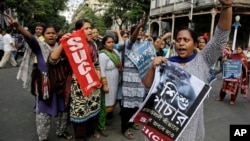Hospitals in India are starting to tag newborns, mothers and medics as well as installing extra security cameras and educating staff to spot baby thieves amid fears that baby trafficking is becoming an organized crime nationwide.
Officials said this was part of a drive starting at government-run hospitals in southern Tamil Nadu state to ensure nurses, doctors and visitors know of the threat of babies being stolen from maternity wards and sold illegally for adoption.
At the Rajaji government hospital in Madurai, the first in Tamil Nadu to introduce the program, laser beams at exit points trigger alarms if untagged adults take babies out.
“We just want to prevent the theft of babies,” N.K. Mahalakshmi, the doctor in charge of laser tagging at the hospital, told the Thomson Reuters Foundation. “It is not fool proof but a deterrent. ... Our hospital staff has also been told to be extra vigilant.”
Traffickers, officials sometimes collude
Campaigners have raised concerns that traffickers are often colluding with officials to steal babies from maternity wards and illegally sell them for adoption.
Mumbai police arrested a gang for convincing single mothers to sell their babies last year, while in West Bengal police found newborns being stolen from mothers in medical clinics after staff told them that their babies were stillborn.
Dev Ananth, a child protection officer in Tirunelveli district, said the state government is investigating several cases where hospital staff persuaded mothers to sell their babies for about 10,000 Indian rupees ($156).
Tirunelveli district will put posters up in every hospital, alerting pregnant women, families and staff to the dangers of trafficking in overcrowded corridors.
“Many don’t see it as a trafficking issue,” he said.
“We are going to train hospital staff to identify potential cases, including what to do if a baby is abandoned at birth. At present, the do’s and don’ts are not clear.”
No official data on trafficking
There is no official data on the number of babies stolen from hospitals in Tamil Nadu, but almost 180,000 children were born in government facilities in 2016, statistics show.
More than four out of 10 of human trafficking cases in India in 2015 involved children being bought, sold and exploited as modern-day slaves, according to crime figures.
“Public hospitals are vulnerable spaces where there are no effective ways to monitor access to newborn babies,” said Paul Sunder Singh of the children’s charity Karunalaya.
